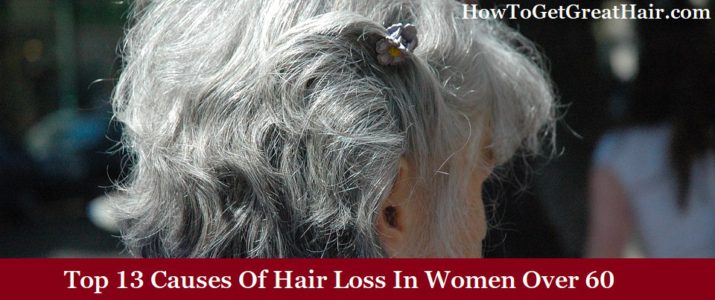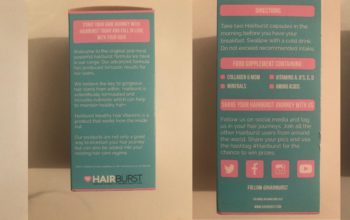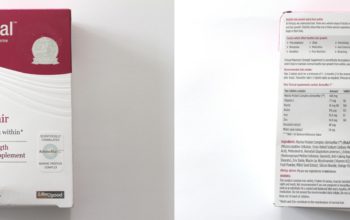
Are you starting to lose your hair slowly – or it’s falling out in pieces?
If you’re over 60, you might say it’s normal. But if you’re a woman – it’s really stressful to lose your hair, even at this age.
And it’s not as normal as you think:
- growing old doesn’t cause hair loss alone
- at most, it’s a risk factor
- there must be some additional cause
So what’s that additional cause making your hair fall out? Well, here are the top 13 causes of hair loss in women over 60.
#1 – Family History
1. Facts
Has your mother experienced hair loss in her 60s? Or has your grandmother’s hair thin out at that age?
Unfortunately, if the answer is yes – you might be at risk.
But here’s the thing:
- Genetic hair loss is usually linked to maternal genes.
- Paternal genes don’t have much to do with it.
In other words – if your father was bald by the age of 60, you shouldn’t worry. It won’t affect you too much, as a woman.
2. Solutions
Unfortunately, you can’t really fight nature and expect to win.
But in this case, I have a #1 recommendation that makes miracles – supplements:
- decrease hair loss and even stop it after 1-2 months
- boost hair growth (and regrowth)
- work from the inside, not just on the outside
- also speed up hair growth considerably
So in case you have a family history of hair loss after growing older – I really recommend you hair supplements.
#2 – Smoking
1. Facts
Are you an avid smoker for many years?
Believe it or not – smoking is one of the top 3 cause of hair loss woldwide.
Besides, if you’re over 60 – it’s even more dangerous:
- Your hair follicles are already weaker (due to aging)
- The hair doesn’t regenerate as before
- Your roots aren’t as strong as they used to be
Now – if you’ve been smoking for over 10 years, you will surely see the effects on your hair.
They’re not so visible when you’re young or middle aged. But when growing older, things change completely.
2. Solutions
Giving up smoking is a must.
However, if you were a big smoker for years – it might be useless:
- your follicles are already affected
- your hair is brittle and grows very slowly
In this case, you might try the recommendations from #1, plus some hair treatments to strengthen your hair.
But even so, I’m not 100% sure you can repair the damage.
#3 – Hair Thinning
1. Facts
Aging alone makes your hair grow thinner.
But a thinning hair is more likely to fall out – that’s why it’s such a major cause of hair loss.
So why exactly does your hair get thinner?:
- Your follicles lack essential nutrients.
- You’ve been smoking for many years.
- There’s a vitamin/mineral deficiency.
- Hormonal changes after menopause.
2. Solutions
Now – no matter which is the cause, your hair didn’t get thinner overnight.
So noticing is the #1 step in this case. Once you see that your hair is thinning out – do something. Don’t let it lose control.
Now – what exactly can do you?
Hair supplements are once again my #1 recommendation – particularly this product:
- treats both hair loss and thinning hair
- adds a lot of volume
- thickens hair strands in a few weeks
#4 – Scalp Rashes
1. Facts
You don’t have to be over 60 to have scalp problems.
However – these issues seem to be more common after aging.
So how exactly can a scalp rash make your hair fall out?:
- Weakens hair roots a lot.
- Makes you scratch constantly.
- Hair follicles can’t receive enough nutrients (due to a swollen scalp).
- If you have some scales, pulling them off will break most hairs on top.
2. Solutions
In this case, you need a medical treatment. It’s the only way to solve the problem completely.
So make sure to visit a doctor whenever:
- your scalp starts feeling itchy
- you feel the need to scratch all day long
- you notice some scales on your scalp
The proper treatment will reduce the rashes soon.
But if you choose random shampoos and unprofessional products, they might get a lot worse.
#5 – Lack Of Proteins
1. Facts
Have you followed a certain diet in the last 6 months? Or you simply stopped eating meat?
Well, if your hair loss started suddenly – this might be the reason:
- Hair strands are made mostly from proteins.
- Once it stops getting proteins from diet, your body tries to save the existent ones.
- So your hair will suffer immediately.
2. Solutions
It’s really simple – starting adding proteins to your diet, even if just a few.
Now – you don’t necessarily have to eat meat.
Many other foods are high sources of proteins:
- eggs
- fish
- certain fruits and vegetables
- milk
You surely like at least one of these 4 – but you can find proteins in many other foods.
However, adding proteins to your diet won’t change anything very soon – you should see the results in a few months.
#6 – Trauma
1. Facts
Stressful events can cause a massive hair loss – even though they are very rare.
Now – I’m not taking about the stress from work, school or exams.
It’s more of a traumatic stress, like:
- death of a family member
- divorce
- a shocking diagnosis
So how exactly can a trauma affect your hair?
Basically – this kind of turnaround event can make your hair follicles stop growing.
Instead, they are forced to get into resting phase. However, this phase lasts 3 months – after that, the hairs fall out. Therefore:
- your hair won’t fall out short after the trauma
- it will start falling about 3 months after
2. Solutions
In many cases, the hair grows back alone.
However – seeing a doctor would help, because he could diagnose the condition and prescribe a real treatment.
So your hair could grow back much faster.
#7 – Certain Drugs
1. Facts
Have you started a prescription treatment recently?
You might be taking a drug that’s affecting your hair roots – thus making your hair fall out.
Now – I’m not talking about chemotherapy, since everyone knows it’s causing massive hair loss.
I’m talking about others, like:
- retinoids
- epilepsy drugs
- certain depression medications
- Parkinson drugs
- cholesterol lowering drugs
- even some supplements
Now – there are many others, but these are the most common for women over 60.
2. Solutions
Consult your doctor and ask him to change your treatment.
If your hair is still falling out – it’s probably not the drugs. But if it stops, you found the case.
Note: Your hair won’t stop falling immediately after you change the treatment. Wait at least 1-2 months to see what happens.
#8 – Auto-Immune Conditions
1. Facts
If you have lupus, rheumatoid arthritis or similar diagnosis – you’re probably no stranger to hair loss.
Auto-immune conditions can sometimes make your hair fall out:
- Weaken the follicles.
- Prevent the roots from getting enough nutrients.
- Hair ends become brittle and dry.
Now – auto-immune problems have dozens of different symptoms.
So they don’t cause hair loss in everyone – just in certain people.
2. Solutions
Keeping your disease under control should solve hair problems and additional symptoms.
It’s only your doctor that can give the right treatment – so I can’t recommend you anything.
#9 – Vitamin B Deficiency
1. Facts
Having too little vitamin B causes lots of symptoms – including hair loss.
Now – there are several types of vitamin B. But having a deficiency in one is just enough.
So what does vitamin B have to do with hair?:
- Nourishes hair follicles.
- Keeps hair strong and lubricated.
- Delivers oxygen necessary for hair growth.
Now – as I said, these are just some of the benefits, because there are many types of B vitamins.
2. Solutions
First of all – it’s essential to discover what kind of deficiency you have (if any):
- consult a doctor
- have some blood tests
In case you have a lack of something, your doctor will prescribe the right treatment.
You can also take vitamin B from supplements, but I don’t really recommend it (especially if you take them randomly).
#10 – Severe Illness
1. Facts
You’ve recently had a surgery, virus or massive infection?
It might sound surprising – but these problems alone might have caused your hair loss.
But it’s not as you think:
- Viruses or infections don’t cause hair loss themselves (only in special cases).
- It’s just that your body was extremely weakened.
- Your hair follicles might have been affected as well.
So basically – if your body has been through a stressful period, all your organs are suffering. That includes your hair.
Let’s say an injury prevented you from eating and resting normally.
Well – as your body lacked many nutrients, your hair also started suffering.
However, your hair loss won’t begin soon after that problem – but a few months later.
2. Solutions
If that’s the cause behind, your hair will recover on its own.
It only needs 2 things:
- time
- additional nutrients
So I also recommend you hair growth supplements – in this case, they’re going to speed up the recovery.
#11 – Thyroid Problems
1. Facts
Have you experienced thyroid issues in the past?
This gland has a major connection with your hair:
- Both hypo and hyper secretions affect the hair.
- Your hair gets very brittle and breaks off easily.
- It also gets visibly thinner within months.
So if you ever had thyroid problems, there are high chances that the gland secretions is damaging your hair.
2. Solutions
Medical treatment is a must in this case.
And it’s not just for your hair – but for your health in general.
The proper treatment should decrease and even stop your hair loss.
However, in rare cases – thyroid medication can cause hair loss itself. In this case, replacing a drug with another one should help.
#12 – Aging
1. Facts
Aging alone can’t make your hair fall out in masses.
However – it can affect its structure:
- Hair follicles can no longer grow as usual.
- They can’t store and receive as many nutrients as before.
- There are no new follicles coming up.
Now – when your hair isn’t in a good shape, any minor damage can make it break off and fall.
That’s why so many older people have very light hair – it’s very sensitive to anything.
On the other hand, others have really thick hair even after aging. So it really depends.
2. Solutions
There’s nothing that could grow your hair like before – at least not at this age.
However, hair growth supplements do help:
- add more volume and thicken your hair
- so it looks fuller than before
Also – hair building fibers are a great solution, if your hair is colored:
- they make your hair roots much thicker
- however, they do nothing for the ends
#13 – Diabetes
1. Facts
Do you happen to be over 60 and have diabetes?
Well – these 2 risk factors put together can really affect your hair.
However, why does diabetes affect hair more often after 60? Here’s the thing:
- Hair follicles are much weaker after this age.
- In diabetes, the run the risk of not getting enough nutrients.
- Also, hair tends to grow much slower than it used it.
- Certain diabetes drugs can also weaken your hair roots.
2. Solutions
There isn’t much to do in this case.
Simply try to keep your condition under control with medication – and the hair loss should stop in about 3-4 months.
If it doesn’t – ask your doctor to change the treatment.
It might be just that drug that’s affecting your hair. So changing it should solve the problem.
My Verdict – So What’s Causing Your Hair Loss?
Why?: If you’re over 60, your hair is a lot more sensitive than in your middle age:
- Follicles are weaker
- They can’t grow as easily as before
- Also, they can’t receive as many nutrients
Now – some women don’t experience any hair thinning or loss after turning 60.
But unfortunately, many do.
What Can You Do?: So if that’s your case as well, here’s what I advise you:
- Check out your family history and see if your mother/grandmother has similar problems at this age.
- Take a look at your medical history.
- Write down if you have diabetes, auto-immune or thyroid problems.
- Also, write down the illnesses you had in the past year (including injuries).
- If you have no medical history, visit and doctor and have some blood tests.
- In case you have any deficiency, he will prescribe you the right treatment.
- If everything seems fine, it’s probably just an aging effect.
My #1 Recommendation: Now – one real remedy I can recommend you are hair loss/growth supplements:
- speed up hair growth
- decrease hair loss
- nourish inside follicles
So this kind of product couldn’t possibly harm you – as long as you choose a herbal based one.
Besides, it doesn’t interact with the drugs you’re already taking, because it’s natural.
So that’s what I really advise you to try, besides the recommendations I suggested above. That should really help.




















Hey Olly, my grandma is 73 and she’s losing lots of hair! She’s been in the hospital recently due to high blood pressure and I could see she has so little hair. Her scalp is almost bald, she just has some longer strands here and there.. and she’s not that old yet, just 74 in December.
Wondering if high blood pressure and heart problems have anything to do with hair loss? but my guess is that not.
Hi there Ginny. I’m sorry to hear about your grandma’s health problems. High blood pressure can be a really complicated disease, especially in her age. But as you suspect, it has absolutely nothing to do with hair loss. You can blame high blood pressure for lots of consequences, but not for hair loss.
Now – when it comes to the real cause, I can’t give you a clear answer. Maybe she’s been through a stressful period lately, she went through a trauma or her body is simply very weakened due to her problem. Also – it might be just genetics. I know some women who lost most of their hair in their 60s and they were otherwise healthy. So it can be family history, but it’s not very common.
And you’re right – 73 isn’t a lot. She should at most experience some hair loss, not losing most of her hair. Is she a smoker? I assume she’s not currently, because of her condition. But has she been an avid smoker before? Does she have any diabetes additionally to her heart problems? Also, does she have thyroid problems?
That might help me get a better idea about the real cause behind her hair loss. There must be one, but I can’t really give you a clear answer at this point.
I could recommend her some supplements, but I don’t think that’s the case. She’s probably taking lots of drugs for her heart problems, and maybe some others too. So there’s a high risk of interactions and I usually don’t recommend people to take more than 10 pills per day.
So maybe we can discover the real cause, so you know what she has to treat.
Hi! I lost my husband in a car crash and it was a real shock for me. In the next months I lost hair constantly, there was nothing I could do to stop it. Every doctor I visited couldn’t find a cause, because all the tests showed nothing wrong. Do you think it’s because of the shock? I’m not over 60 but I’m thinking it could happen even if you’re younger. My hair is starting to grow back but slowly. Do you think a supplement would be safe? I’m not taking any drugs and otherwise healthy, but I’m afraid I might have something more serious. Your advice would really help me, thanks.
Hi Evelina. I’m really sorry for your loss. But yes, I’m pretty sure this is the cause of your sudden hair loss.
It actually makes sense, you suffered a shock and your hair follicles got straight into the resting phase instead of growing normally. In this case, you are going to see the consequences later (usually after 2-3 months). That’s exactly when you started losing your hair – so in my opinion, that was surely the cause.
Also, all your blood tests were fine – which shows there’s no other internal problem. So this kind of trauma can really destroy your hair, even if you’re not over 60.
Now – the good news is that your hair isn’t permanently affected. As you could already notice, it’s growing back slowly.
So I actually recommend you a supplement that would stimulate and speed up hair growth. Folexin is my top recommendation, because it’s really effective and so cheap, compared to others. And don’t worry – it’s a really safe supplement, because it’s mostly herbal based. Even if you were taking other drugs, you could still use it.
This product could make your hair grow about 2-3 times faster, which is a lot. So in about 3-4 months, it could be shoulder length (obviously, it also depends on how fast your hair grows normally).
So at this point, I think that’s the best solution for this. Hope it helps.
I have an itchy scalp and rashes coming up from time to time. My specialist says it’s an allergy, but I’m not sure. What could I be allergic to? Could that be making my hair fall out? I’m 62 but look younger.
Hi Lynne. When it comes to hair it doesn’t really matter if you look younger or things like that. Once you go beyond 60, often times it starts thinning or falling out.
Now – regarding your problem, it could be an allergy. Allergies can cause shedding sometimes, but it happens quite rarely. I mean – it’s not a common symptom. So if you’re allergic to something, you should get other major symptoms first (like coughing, sneezing, rashes – not just on your scalp).
Your doctor should have tested you for some allergic substances. Seems like he still didn’t find the cause.
Anyway – it could also be a problem of your scalp (like dermatitis, folliculitis, etc). Not all of these disorders lead to hair loss, but they can cause itching – which can make you pull off hair follicles, from constant scratching. You said your scalp is itchy, so you might have this kind of problems.
However, I can’t tell for sure. If you give me more details, I might be able to help more.
Hello Olly, I’m suffering from hair loss and couldn’t find a major cause yet. maybe you can help:
– have had fine hair all my life, with thin strands and little volume
– the women from my mother’s side all had the same type of hair
– they were 30% bald by the age of 70 (those who reached this age)
I’m far from 70 yet but I realized my hair strands are getting thinner year after year. It all started after menopause, which was over 10 years ago, but I couldn’t feel a big change. I think it was just a gradual thinning. I also have kidney problems but I don’t think that’s related to my hair, is it? And if it’s genetic, do you think I have any chance left or I will have to live with this for the rest of my life?
Hi Mary, I’m sorry for the issues you’re going through.
But judging after the details you provided, I’m pretty sure your hair loss is genetic. That especially because all your women relatives had the same hair type as you did in your youth. Since they experienced hair loss after 60, there are high chances that you also experience it.
Your kidney problems have absolutely nothing to do with it – as long as there’s no hormonal imbalance. But I doubt there is any, since you didn’t mention it.
Now – in my opinion, you still have enough chances to stop your shedding (especially because you have enough hair left). Here what I advise you:
1. Try a hair growth supplement based on herbal extracts. Folexin is my top choice, as it’s much cheaper than many others. It’s good for growing new hairs, thickening and reducing hair loss. Plus, it can also help with volume.
2. I don’t know anything about your eating habits, but try eating more fruits, vegetables and natural foods. These are usually rich in vitamins – and that’s what you need right now, an extra boost of vitamins.
3. You can also follow 2 guides I have on growing hair faster in a natural manner and decreasing thinning hair. The advice is pretty much the same I already mentioned, but the actual steps might help.
Obviously – don’t expect any miracles overnight. But if you have patience, you should see some real effects in 2-3 months. Please let me know how it goes.
Can this be used on an 8year old boy with a bald spot
Hey Geraldine, what exact product are you asking about?